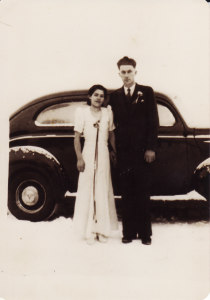In Mr. Loeppky I saw one possible direction, a downward path. In Dad I saw another possible direction, an upward path.
By age 12 in the mid-1920’s, Dad was already working on his father’s threshing crew in rural Manitoba. Shortly after the devastating stock market crash of 1929, crops began to fail due to prolonged drought, and work became scarce. As a young man in the midst of the Great Depression, he joined hundreds of other out of work men who leapt into empty boxcars or rode the rods, looking for employment. Often his pay was $1.OO per day, when he could find work.
After his parents lost the family farm in the 30’s, they moved to a small settlement known as Barkfield. For the most part, its inhabitants consisted of two large families, the Martens and the Funks.
At times Dad worked in the bush with the young Funk men, cutting cordwood for which there was a market in Winnipeg. He developed great admiration for their ability with axes and saws. “They were skilled and very quick,” he told me in later years. “I could never keep up with them.”
Dad and the Funk boys became close friends. One day Jim Funk asked him, “are you going to the barn dance tonight?” Dad said, “No, I don’t have anyone to take”.

“You can take my sister Annie,” Jim said, as though there was no doubt she would agree. Annie was a light hearted young gal with long black hair. She did agree to the date, the beginning of a romance later culminated in marriage.
When World War 2 started, Dad was drafted but registered as a Conscientious Objector. Many adherents of the Mennonite faith were pacifists, one of the primary reasons they had emigrated from Russia. They had left behind established villages, thriving farms and a stable, satisfying existence. A judge questioned Dad as to his reasons and apparently decided his motivation was genuine. He was sent to a forestry camp in Ontario and then to work as a tipple operator loading train cars at a coal mine in Saskatchewan.
In about 1946 Dad bought a Model A Ford and prepared to move the family to BC. All our belongings were in a single trunk strapped to the back of the vehicle. With two paying passengers to help cover the cost of gas, our family made the at times arduous trip to Abbotsford, B.C.
Dad’s family had made the move previously and his brother Cornie was working as a heavy equipment operator. Although Dad’s experience with motorized equipment was limited, Cornie got him a job running a bulldozer. When the dyke along the Fraser River was being constructed, he was hired as a heavy equipment operator. Because he refused to work on Sunday, which in the Mennonite faith is considered a holy day, he was let go. His faith would always be important in staying on what I think of as his upward path.
